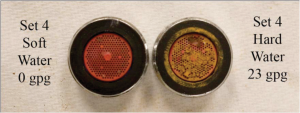Ensuring the Quality of Your Water Softener
Good quality drinking water is considered a priority for health and well being. While the EPA sets standards for regulating the levels of potential contaminants in drinking water supplies, the most common cause of poor quality drinking water is actually hard water. Hard water is the term given to water with high levels of magnesium or calcium and it can create an unpleasant taste when drinking, even in hot beverages such as tea or coffee. While the level of water hardness can determine the potential damage to household appliances, even lower hardness levels can affect the taste of drinking water. Fortunately, there are a number of different types of water softener devices, which can remove the particles of magnesium and calcium, reducing the hardness of the water. Not all these devices are made to the same standards, so it is important to ensure that your chosen system is of the highest quality.
There are a number of water treatment options available to domestic customers, but water softeners are often considered to be the most economical and readily available choice. A water softener is considered to be primarily used for removing hard water particles such as calcium and magnesium. However, some good quality devices can also remove potentially harmful contaminants such as lead, chlorine and copper.
Water softeners use ion exchange to remove the mineral particles. There are a number of different styles of water softener device, which tend to be a cheaper alternative to more sophisticated water treatment systems such as reverse osmosis. The price of water softeners can vary greatly and a more expensive price tag does not necessarily denote the best quality. Fortunately, there are a number of ways to ensure that you purchase a good quality system.
Ensuring Quality:
The main method of ensuring your purchase a good quality water softener is to check the certifications. While this may seem a little complex, there are many units which are certified by reputable industry groups. These certifications provide the assurance that the device or system has passed the industry standard tests and any manufacturer claims have been tested and validated. Some of the most prominent certifications to look for are the Gold Seal from the Water Quality Association a seal from Good Housekeeping. However, there are a number of other certifications which are noteworthy including the UL listed Product, a seal for UL Recognized Component, a CE mark and a certificate for the Uniform Plumbing Code.
Another method of ensuring quality is to check the manufacturer warranty. A warranty is often a method for a manufacturer to showcase the confidence they have in their product range. It is a good idea to compare the warranties offered by different manufacturers. High quality products are usually supplied with a comprehensive warranty.
Additionally, it is a good idea to choose a manufacturer with a strong reputation in the industry. Established reputable dealers will often provide free water testing to confirm the extent of hard water issues and if there are any other issues with water contaminants. Generally, these dealers will deliver a high standard of service which includes a wide product line to suit all requirements and expert installation. This will ensure that your water softener delivers great quality drinking water for years to come.
About The Author:
Greg Scott is President of Valparaiso based Miracle/EcoWater Systems, the premier water conditioning company in Northwest Indiana serving the Lake, Porter and LaPorte County areas. A 3rd generation water treatment professional, Greg grew up in the family owned business started by his grandfather in the late fifties. He has made water treatment his life and under his direction and high-standards, the company’s water treatment experience, knowledge, and products are unrivaled in region.
Back to

